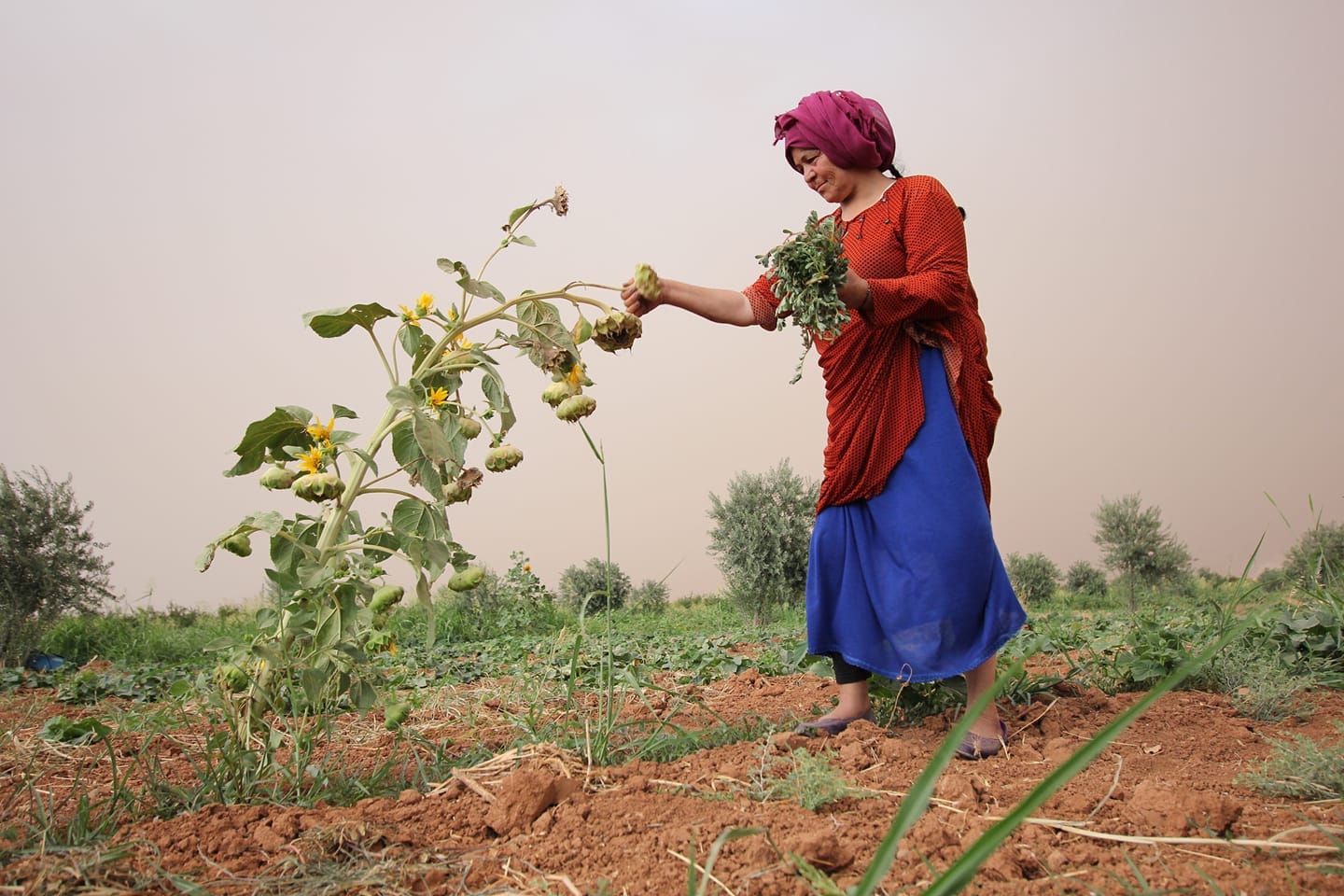Revolutionary Cooperatives in Rojava: Reimagining Justice and Ecology Through Jinwar

Photo credit: https://jinwar.net/
We are living in a time of existential crises, unfolding across the globe—from accelerated natural disasters driven by climate change to degraded farmlands caused by monoculture, and the continued marginalization of women and minoritized communities. Global neoliberal capitalism and authoritarian states have shaped our collective imagination to the point that we struggle to envision alternative ways of organizing our communities. With the rise of fascism in many states, it has become urgent to seek out and learn from examples of different, more just ways of living. Rojava—and particularly Jinwar—offers precisely the kind of inspiration we so desperately need.
Rojava, meaning “West” in Kurdish, refers to the western part of Kurdistan, known today as the Autonomous Administration of North and East Syria (AANES). Emerging from the Syrian Civil War in 2012, Rojava has become the site of a radical political and social experiment rooted in the ideology of democratic confederalism—a system that rejects both the nation-state model and capitalism. This governance model is built upon three foundational pillars: gender emancipation, direct democracy, and social ecology.
Unlike conventional states, Rojava prioritizes decentralized governance and ecological sustainability. Cooperatives, self-managed by the people, serve as the backbone of the economy, resisting both capitalist exploitation and state control. It is an example of a community where women are not only participating but leading, shaping their own futures in defiance of patriarchal structures.
Rojava’s cooperatives extend beyond economic sustainability; they are fundamental to its ecological and political resistance. In a region historically exploited through state-led monoculture, fossil fuel extraction, and environmental degradation, these cooperatives prioritize organic farming, water conservation, and reforestation. Through these regenerative practices, they have revived lands once depleted by extractivist policies.
Jinwar is one of the most powerful manifestations of Rojava’s principles in action. A village built by and for women, its construction began on March 10, 2017, immediately following International Women’s Day celebrations. The village officially opened on November 25, 2018, aligning with the International Day for the Elimination of Violence Against Women.
Jinwar is home to women who have reclaimed their autonomy—those who have broken free from abusive families, those who have persevered after losing partners to war, and those who have chosen to build a communal life with other women on their own terms. It is not merely a place of refuge, but a space where women redefine their roles and reclaim control over their lives.
The village consists of 30 homes, a school, a bakery, the ŞîfaJin health center, an academy, and a small shop. The houses are built using traditional mud-brick techniques that have sustained the region for thousands of years, blending cultural heritage with environmental sustainability. A newly planted garden transforms the landscape, thriving with fruit trees, olive trees, tomatoes, cucumbers, watermelons, paprikas, aubergines, and wild-growing parpar (portulac), all flourishing with minimal intervention. Women here do not just live communally; they actively build and sustain the village. They shape bricks with their bare hands, constructing their own homes—laying the foundations not just for a village, but for a self-sufficient, cooperative way of life. Everything in Jinwar is managed collectively; there are only women and children, creating a sanctuary for those who have fled violence—whether domestic or war-related.
The women of Jinwar engage in wheat foraging, farming, baking, and food preparation—revealing that tending to the land is inseparable from tending to each other. In a scene from the documentary Jinwar, a village leader reflects on this ethos, stating: “The unified mentality and soul—that is what we call the social communal mindset.” This philosophy forms the backbone of Jinwar’s governance and daily practices, where communalism replaces individualism. Such practices not only sustain the village but also dismantle patriarchal and exploitative systems, even as the community navigates ongoing external threats and resource scarcity.
Jinwar’s achievements are particularly notable given the challenges it faces. Located near the Turkish border, the village endures ongoing threats from drone strikes, cross-border bombardment, and resource blockades. Water scarcity, exacerbated by climate change and Turkey’s control over upstream water sources, has forced residents to implement conservation measures and deepen wells. Despite these challenges, Jinwar continues to thrive. Recently, during a Q&A session in January 2025 with Nadia Derwiş, the director of the Jinwar documentary (2024), I asked about the latest developments in the village. Nadia, who lives in Rojava, shared that despite the continuous attacks on Rojava by Turkey, the village remains strong. She highlighted that one of the community’s greatest strengths is its natural medicine practice—women harvest plants and create remedies so effective that people from neighboring villages now visit Jinwar to obtain them.
Jinwar is not just a village—it is a vision for an alternative way of living. It stands as proof of the power of collective resistance, care, and the reimagining of a world beyond patriarchal, nationalist, and capitalist oppression. It is a living example of what is possible when women take control of their own futures, nurture their communities, and restore their relationship with the land.
Witnessing women reimagine their world beyond the constraints of oppressive patriarchal, nationalistic, and capitalist systems gives me hope for a future rooted in cooperation and mutual care.
What if a better world is one where women, Indigenous communities, and the oppressed reclaim the power that was always theirs?
Learn more about Sheelan Qader, the author